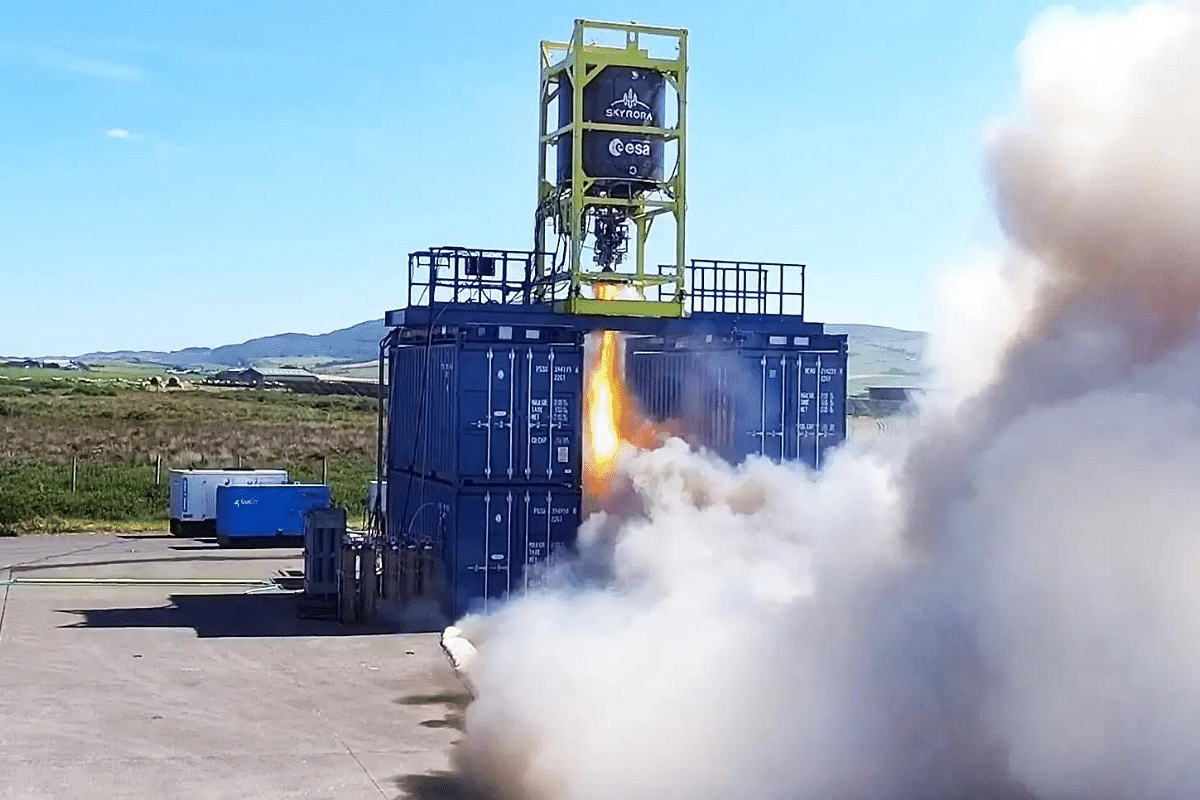Science
UK Rocket Startup Completes Key Test Towards Britain's First Vertical Launch From Home Soil
- Skyrora has strengthened its bid to become the first British company to conduct a vertical launch from UK soil.
- Its landmark test marked the largest integrated stage test held in the UK in 50 years.

Skyrora's second stage static fire engine test (Photo: Skyrora)
British rocket company Skyrora successfully completed the static fire test of the second stage of its flagship Skyrora XL orbital rocket.
It was a milestone move for the company as the 18 August test was the "biggest integrated stage test to be held in the UK (United Kingdom) since... the 1970s," a statement said.
With this test, Skyrora has strengthened its bid to become the first British company to conduct a vertical launch from UK soil.
The test was held at Discover Space UK at Machrihanish Airbase in Scotland. The entire test operation — "from clean tarmac to a full static fire test" — took just 2.5 days, Skyrora Chief Operations Officer, Colonel (US Air Force, retired) and former SpaceX Vice President, Lee Rosen, revealed.
“The static fire test looks, sounds and feels a lot like a rocket launch, but without lifting off!" he said.
The 20-second burn proves, as per the statement, "the vehicle’s operational capability for its intended payloads and... that its performance meets all the design requirements."
The single 70kN liquid engine, which will be used in the first and second stages, was able to kick up the expected thrust during the test.
Skyrora XL is a three-stage, small satellite launch vehicle intended to place payloads into sun-synchronous orbit.
The rocket's third stage was tested back in December 2020 — it was a milestone test as well, since it made for the first integrated stage test by a commercial launch vehicle developer in the UK.
The third stage has the ability to place a payload into low-Earth orbit from a range of altitudinal and orbital inclinations.
The second stage was the subject of the latest test. This stage kicks in at about 62 km altitude, paving the way for the third stage to fire up at around 190 km to achieve orbital velocity of 28,000 km/h.
The second stage was assembled at the new Skyrora manufacturing and production facility — the largest of its kind in the UK — which opened 14 July in Cumbernauld, Scotland. The facility plans to begin churning out 16 vehicles a year after mass production takes off.
As for Skyrora XL's first stage, it is "currently in construction, with hot fire tests due to take place in mid-2023," according to the statement.
The company produces rocket engine components using a hybrid 3D printer called Skyprint 2 — the largest of its kind in Europe. The technology gives Skyrora full autonomy over the engine manufacturing process.
After the 18 August test, the British rocket startup has inched closer to entering the commercial market.
According to Skyrora founder and chief executive Volodymyr Levykin, the test "put Skyrora on track to become a key part of the UK’s new space industry as the first British company to conduct vertical launch from UK soil."
The debut orbital launch with the Skyrora XL is coming up in late 2023 from the SaxaVord Space Centre in northern Scotland. Towards the launch, the company submitted its application early August to the UK Civil Aviation Authority to obtain the licence required for commercial spaceflight activities. The process will take nine to 18 months.
Established in June 2017, Skyrora is headquartered in Edinburgh with facilities located across Europe. It has received funding from the European Space Agency and UK Space Agency.
The UK has been completely reliant on the United States for space launches. Prospero remains the only British satellite to be put into orbit using a British vehicle. That was back in 1971, and lift-off was from Australia. The UK is now looking to develop sovereign launch capabilities.
"When it comes to getting off the ground we contribute to the work of others rather than taking the lead ourselves. This strategy is about changing that," Boris Johnson said in his foreword to the National Space Strategy, published September 2021.
With this strategy, a key ambition for the UK is to become the first country in Europe to launch satellites into space from home soil. The country especially wants to tap into the commercial small-satellite launch market.
Space is one of the UK’s fastest growing sectors, trebling in size since 2010. Globally, the space economy is set to be worth around £490 billion by 2030. The UK is striving to capture 10 per cent market share by then.
Support Swarajya's 50 Ground Reports Project & Sponsor A Story
Every general election Swarajya does a 50 ground reports project.
Aimed only at serious readers and those who appreciate the nuances of political undercurrents, the project provides a sense of India's electoral landscape. As you know, these reports are produced after considerable investment of travel, time and effort on the ground.
This time too we've kicked off the project in style and have covered over 30 constituencies already. If you're someone who appreciates such work and have enjoyed our coverage please consider sponsoring a ground report for just Rs 2999 to Rs 19,999 - it goes a long way in helping us produce more quality reportage.
You can also back this project by becoming a subscriber for as little as Rs 999 - so do click on this links and choose a plan that suits you and back us.
Click below to contribute.
Latest